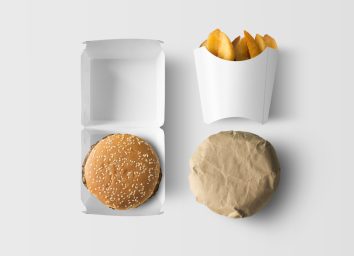6 Toxic Food Ingredients That Have Been Linked to Cancer
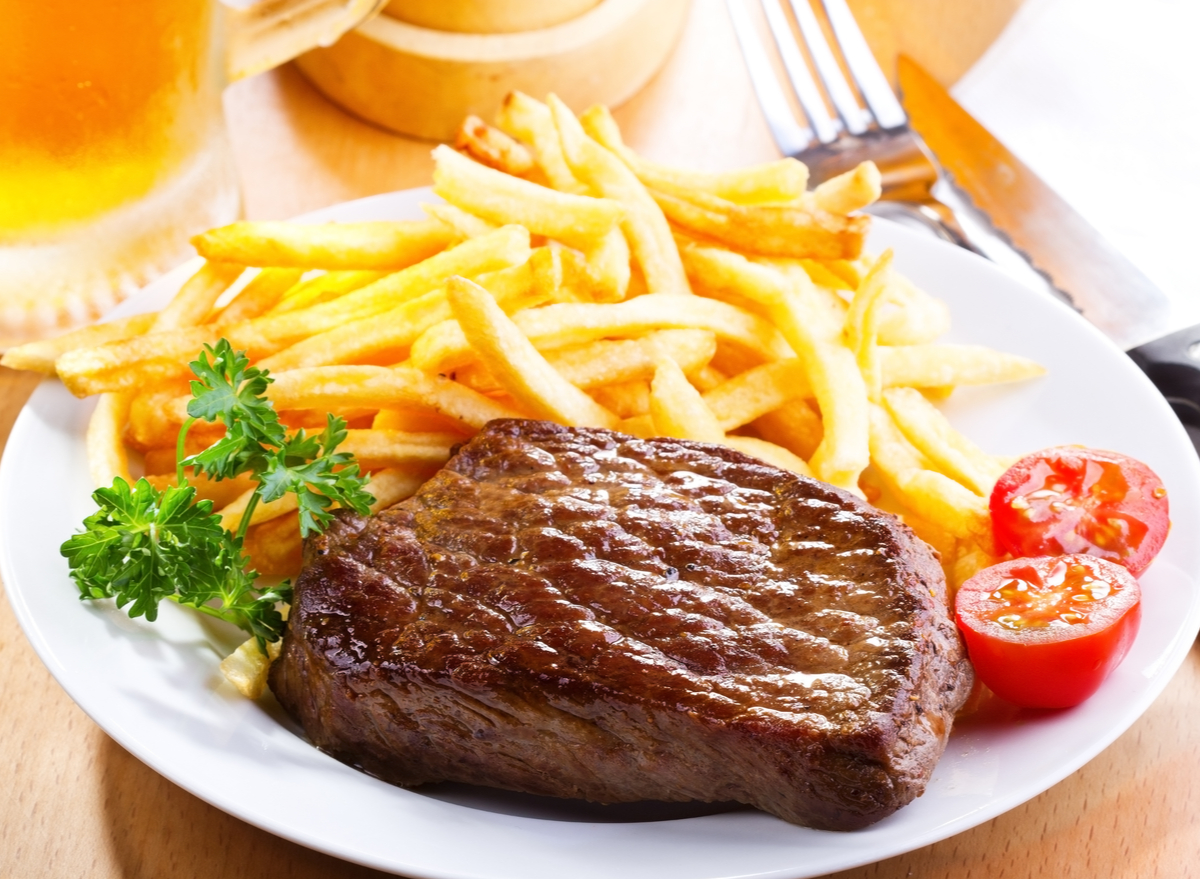
Before you take a big bite of that juicy burger or sprinkle cinnamon on your morning oatmeal, you should know that you might be consuming chemicals that have been linked to cancer. That’s right, the FDA hasn’t banned all toxic ingredients quite yet.
Part of the reason these chemicals still exist in our food is that they have shown conflicting results in studies. For example, the artificial sweetener Aspartame, found in many soft drinks, has long been debated as a potential carcinogen. While a recent 2021 study published in Environmental Health reported aspartame to cause cancer in rodents, the FDA still labels Aspartame as a safe sweetener.
Cancer-causing chemicals are also present in our food unintentionally. Unlike an artificial sweetener that’s added to enhance the taste of your diet soda, chemicals such as Aflatoxins can work their way into animals that produce our meat and dairy products. While these chemicals are known carcinogens, it’s difficult to regulate them because it’s all dependent on detection.
But there are safe ways to limit your exposure to cancer-causing food ingredients, such as turning to food alternatives, monitoring cooking times, and adding an extra step to food preparation.
Read on to find out exactly what toxic food ingredients have been linked to cancer and the ways you can avoid them.
And for more, don’t miss 8 Fast-Food Chains With the Most Toxic Food Packaging.
Acrylamide
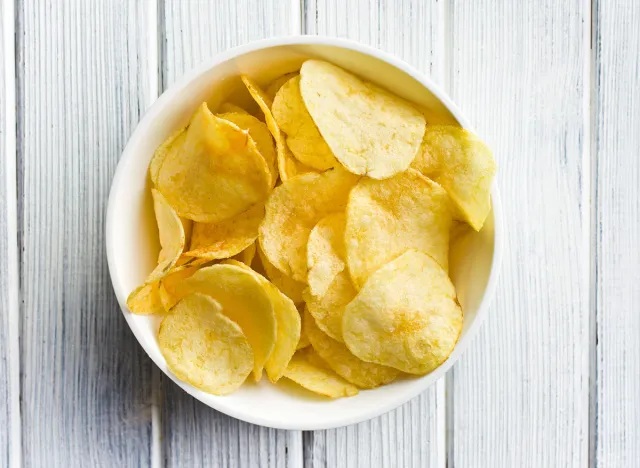
Acrylamide is a chemical that’s used to make paper, dyes, and plastics, but it can also be found in our food. It’s been identified by several organizations—the US National Toxicology Program, US Environmental Protection Agency, and International Agency for Research on Cancer—as a likely human carcinogen. The FDA reports that acrylamide is common in plant-based foods cooked at high heat. They recommend avoiding foods with high levels of acrylamide: potato chips, French fries, cookies, toast, and certain types of cereal. There are also certain food prep strategies to reduce the amount of acrylamide in your food, such as soaking raw potatoes in water before cooking them.
Heterocyclic amines (HCAs)
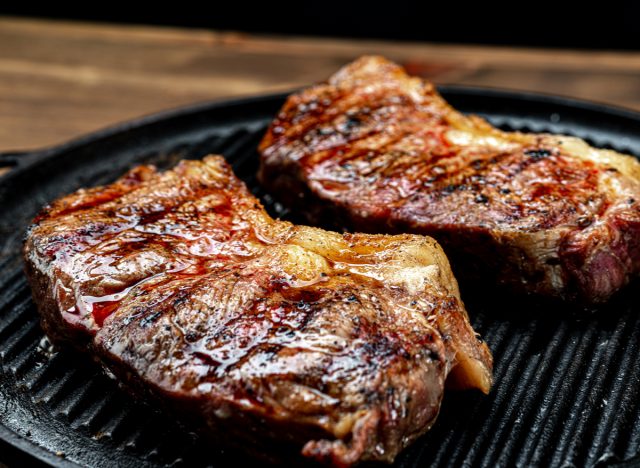
Think twice before eating red meat, because chemicals called HCAs are mutagens in meat that have been linked to cancer. The National Cancer Institute (NCI) explains how HCAs are often formed when meats are cooked at high temperatures, because that’s when amino acids, sugars, and creatine or creatinine react, thereby altering DNA. To reduce the risk of cancer, NCI recommends turning your meat a lot when you cook it, microwaving your meat before cooking it at a high temperature, and taking off any char before you eat it.
Polycyclic aromatic hydrocarbons (PAHs)

Much like HCAs, PAHs are commonly found in red meat. However, according to the National Cancer Institute, PAHs are actually found in the smoke produced by cooking meat. When the fat and juices drip onto the grill, that smoke will contain PAHs that then attach themselves to the meat. That’s why PAHs are also found in other smoked foods beyond meat, like chicken or fish. The best way to avoid PAHs is to not cook your meat over an open flame, and if you do, make sure you limit the amount of time it is on the grill.
Aflatoxins

Aflatoxins sneak their way into our nuts and grains primarily via two fungi species: Aspergillus flavus and A. parasiticus, according to the World Health Organization (WHO). WHO reports that aflatoxins are carcinogens that have been known to cause liver cancer. According to the FDA, the chemical also affects animals, so it can be transferred into animal products such as milk, meat, and eggs. The best way to avoid aflatoxins is to proactively check expiration dates and buy local ingredients when you can.
Coumarin

Before you take a bite of that cinnamon roll, you should know that certain types of cinnamon contain a toxic compound called Couramin. Healthline reports that Couramin can cause cancer if consumed regularly. There’s still a way to get your cinnamon fix without the risk of ingesting Coumarin: simply use Ceylon cinnamon, according to Healthline. Your best bet is to purchase it on Amazon.
Hydrazines
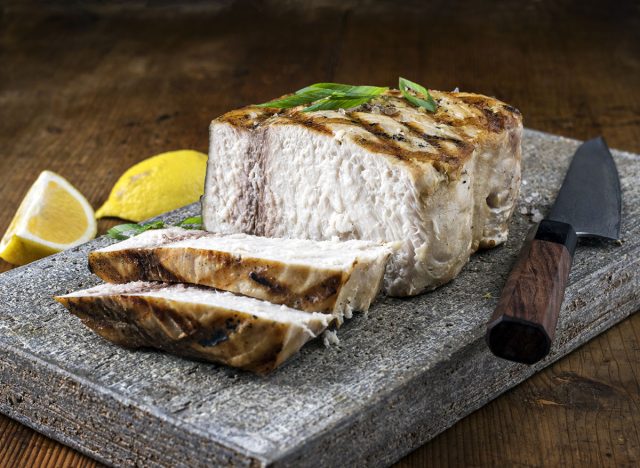
Most commonly found in our environment, Hydrazines are also present in some of the foods we eat, such as fish that were in contaminated water or plants that naturally built up the chemical. The CDC reports that hydrazines are known carcinogens; they’ve caused tumors in multiple animal organs, including the lungs, blood vessels, and colons. The FDA has already regulated that hydrazines cannot be added to water for steam that will come into contact with food, but it’s difficult to detect the presence of this chemical in contaminated fish.

